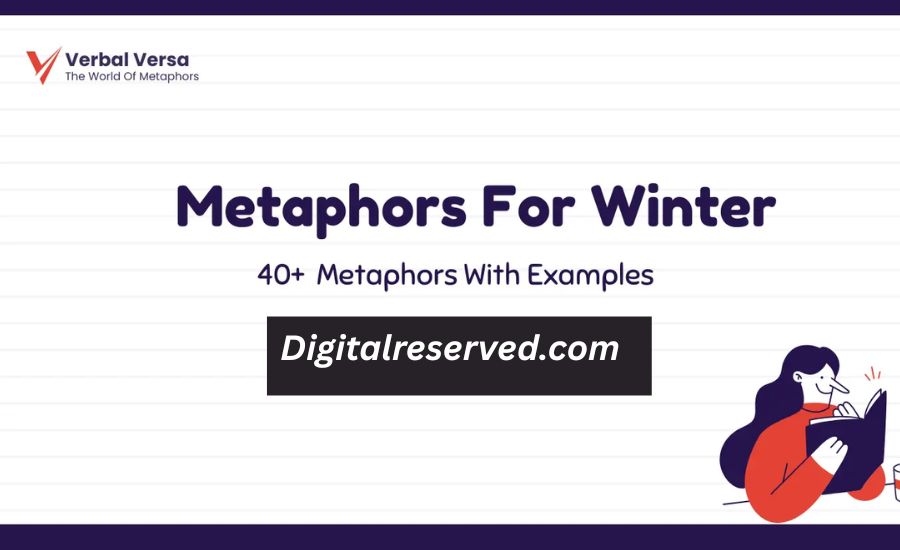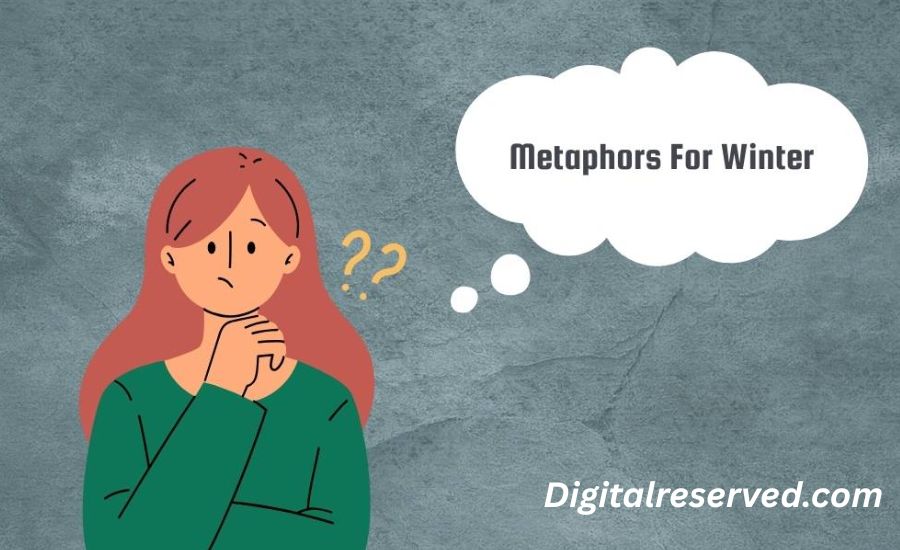Metaphors for Winter is more than a drop in temperature or the sight of snow-draped bushes—it’s a season rich with symbolic meaning and emotional intensity. While the crisp winds and icy mornings define its physical presence, iciness also conjures up effective imagery that goes a long way past the weather record. For writers and poets, metaphors serve as a bridge among the outer global and inner revel in, transforming iciness into a source of suggestion and mirrored image. These comparisons provide a sparkling perspective, allowing us to view iciness not just as a season of bloodlessness, but as a time of stillness, transformation, and quiet splendor. In this article, we’ll discover how metaphors carry winter to existence in language, inviting us to experience its proper essence in a greater resourceful manner.
1. Winter Drapes the Earth in a Soft White Quilt
Meaning: Snowfall covers the whole thing in sight, developing a non violent, unified landscape.
In Context: The streets, rooftops, and treetops lay silent beneath a thick, white duvet, as even though nature itself has been gently tucked in for a long relaxation.
Alternative Expressions:
- Winter wraps the arena in a snowy duvet.
- The season arrives like a frost-stitched comforter embracing the land.
2. Winter Reigns Over a Crystal Kingdom

Meaning: The world is converted into an stylish, icy domain ruled by way of bloodless and stillness.
In Context: As you walk thru the glistening forest, it appears like stepping into a majestic crystal state, wherein silence is law and ice glints like royal jewels.
Alternative Expressions:
- Winter commands a glacial realm.
- The cold season is a monarch ruling over an empire of frost.
3. Winter is Nature’s Icy Artist
Meaning: Winter decorates the herbal international with problematic frost styles and shimmering snow.
In Context: Each morning, the home windows undergo the sensitive brushstrokes of iciness’s artistry, as if an unseen painter had visited in a single day.
Alternative Expressions:
- Winter sketches beauty with frost and snow.
- The season is a silent illustrator, crafting scenes in silver and white.
4. Winter is a Quiet Intruder of Warmth
Meaning: Winter gradually removes warmth and sound, replacing them with silence and cold.
In Context: The season moves in without warning, like a quiet intruder, stealing the colors and cheer of autumn and replacing them with a solemn hush.
Alternative Expressions:
- Winter is a subtle eraser of warmth.
- The season acts like a hushed pickpocket, taking away the vibrancy of life.
5. Winter as a Haunting Presence
Meaning: Winter drifts via the land like an eerie spirit, cold and intangible.
In Context: The wind moves through the barren timber with a soft moan, as though wintry weather itself had been a ghostly parent wandering the woods.
Alternative Expressions:
- Winter is an icy phantom.
- The season acts like a breathless apparition, chilling all it touches.
6. Winter as a Quiet Orchestra
Meaning: The quietude of wintry weather is full of concord—smooth, gradual, and beautiful in its stillness.
In Context: As snowflakes descend in silence, they create a moment of peace, as though nature were appearing a wordless symphony only the soul can listen.
Alternative Expressions:
- Winter is a sensitive harmony whispered in white.
- The season composes a melody of muted grace.
7. Winter as a Cold Embrace
Meaning: Winter holds the sector in its cool, enveloping hold close.
In Context: When I step outside, the air presses near, enveloping me in winter’s crisp and silent embrace.
Alternative Expressions:
- The season clasps the earth in a chilly hug.
- Winter wraps us in a shiver-soft cuddle of frost and air.
8. Winter as a Frozen Melody
Meaning: Winter’s sounds—ice cracking, snow falling—form a slow, haunting song.
In Context: The lake speaks in sharp notes of cracking ice, its frozen song echoing through the hushed landscape.
Alternative Expressions:
- Winter hums a melody chilled in silence.
- The season sings with frosted tones and crystal echoes.
9. Winter as a Silver Shroud

Meaning: Winter casts a glimmering, icy layer over the earth, veiling it in splendor.
In Context: At dawn, the grass glistens below a glistening sheet of frost, cloaked in iciness’s silver veils.
Alternative Expressions:
- Winter drapes the land in a shimmering cowl.
- A frosty mantle rests quietly over the whole thing.
10. Winter as a Living Snow Globe
Meaning: The swirling snow fall makes the sector experience enclosed in a paranormal sphere.
In Context: As flakes dance in the wind around me, it looks like I’m walking inside a snow globe, where the entirety slows down and wonder fills the air.
Alternative Expressions:
- Winter encases us in a dome of drifting beauty.
- The world spins like a frozen sphere full of dreams.
11. Winter is a Cozy Cabin
Meaning: Represents a tranquil and safe space that keeps us safe from the mayhem outside.
In Context: His modest house, with its glowing fireside and thick timber partitions, felt like a comfortable cabin inside the heart of wintry weather—quiet, safe, and comforting for his children.
Alternative Expressions:
- Winter wraps the soul in a cabin of calm.
- A small home becomes a sanctuary in the heart of the cold.
12. Winter as a Blanket of Snow
Meaning: Represents a protective and preserving layer that gently shields the earth.
In Context: As he stepped outside into the biting cold, he felt the snow-covered landscape embrace him softly—winter had spread its blanket over everything, offering quiet protection.
Alternative Expressions:
- Winter cloaks the world in a silken white layer.
- Snowfall acts as nature’s gentle quilt.
13. Winter’s Lullaby
Meaning: Describes the calming, nearly musical impact of softly falling snow.
In Context: The rhythmic hush of snowflakes drifting from the sky become winter’s lullaby, soothing the bustling town into a rare second of silence and relaxation.
Alternative Expressions:
- Snow sings a lullaby of silence.
- The season hums a melody of stillness.
14. Winter as the Keeper of Secrets
Meaning: Suggests that winter holds hidden truths beneath its icy surface, guarding the mysteries of nature.
In Context: After a long walk through the frost-covered woods, she whispered that the forest, silent and snow-laden, felt like winter itself was holding ancient secrets close.
Alternative Expressions:
- Winter veils forgotten tales beneath the frost.
- The season hides stories in frozen shadows.
15. Winter is a Warm Hug
Meaning: A metaphor for the emotional consolation that may be discovered even in the coldest instances.
In Context: Though the wind howled outside and the school room was drafty, his thick coat enveloped him so warmly that wintry weather itself felt like a comforting hug, soft and serene.
Alternative Expressions:
- Winter embraces with gentle warmth.
- The season cradles the soul with quiet love.
16. Winter as the Snow Monarch
Meaning: Represents winter as a royal figure that rules the landscape with elegance and a chilling presence.
In Context: The snow monarch had taken its throne across the hills, dressing every tree and rooftop in regal white, turning the landscape into a scene of majestic stillness.
Other Ways to Say It:
- Winter wears a crown of snowflakes.
- The frost queen blankets her kingdom in silence.
17. Winter as the Ice Librarian
Meaning: Symbolizes winter as a quiet keeper of frozen memories, preserving moments as if storing books in an icy archive.
In Context: Beneath the frozen canopy, it felt as though the ice librarian was at work, carefully cataloging nature’s stillness into crystalline volumes no one else could read.
Other Ways to Say It:
- Winter archives emotions in frozen silence.
- The frost arranges time like pages pressed beneath ice.
18. Winter and the Frost Giant’s Footsteps
Meaning: Suggests the enduring, powerful impression of extreme cold on the landscape, as though a mythical giant had passed through.
In Context: As Jimi wandered through his grandfather’s garden, every crunching step and frozen puddle felt like the aftermath of the frost giant’s slow, heavy march.
Other Ways to Say It:
- A frozen legend’s passage is marked by ice trails.
- Winter’s weight presses heavily on the earth.
19. Winter as a Snow-Clad Challenge
Meaning: Portrays winter as a towering, snow-covered mountain that tests one’s strength and resilience.
In Context: The snow turned the land into a stunning sculpture, inviting onlookers to witness its quiet power and daring adventurers to rise to its snowy heights.
Other Ways to Say It:
- Winter is a white-cloaked mountain calling the brave.
- The cold season stands tall, daring souls to climb.
20. Winter as a Frozen Tundra
Meaning: Depicts the season as an inhospitable yet mesmerizing expanse of frozen terrain, marked by silence and survival.
In Context: As snow continued to fall on the lifeless streets, the city evolved into a frozen tundra—unforgiving, wide, and shrouded in frost. Every step echoed against the frozen ground, every breath steaming in the harsh air.
Other Ways to Say It:
- Winter is a land of still breath and stone-cold silence.
- The globe turns into a white, wind-chilled wasteland.
21. Winter as a Wizard
Meaning: Portrays winter as a magical being that transforms the world with quiet, effortless grace
In Context: He shared with his family how, almost overnight, winter’s magical hand had turned the quiet valley into a palace of light and frost—an enchanted world sculpted in ice.
Other Ways to Say It:
- Winter casts spells of snow and silence.
- The season waves its wand, and everything glistens anew.
22. Winter as a Blank Canvas
Meaning: Suggests the season offers a fresh start, encouraging introspection, creativity, and the promise of new beginnings.
In Context: As she gazed across the untouched snow, it felt like winter had painted the world white—a blank canvas where anything felt possible, calm, and clear.
Other Ways to Say It:
- Winter erased yesterday, making space for tomorrow.
- The snow becomes a silent sketchpad for hope.
23. The Chill That Walks
Meaning: Describes cold as a living presence, moving subtly like a spirit through the streets and trees.
In Context: As night approached and the streets emptied, he felt it—the chill that walked beside him, whispering with the wind and brushing his cheeks like invisible fingers.
Other Ways to Say It:
- Cold winds roam like silent watchers.
- Winter walks without footsteps, only felt.
24. The Winter Quilt
Meaning: Captures the comforting nature of snow as it lightly covers and softens the arena around us.
In Context: Watching snow fall for the first time, they marveled because the landscape slowly changed—blanketed in a gentle white quilt that muffled sound and softened the rims of the entirety.
Other Ways to Say It:
- Snow tucks the earth in for a long, quiet rest.
- Winter’s quilt comforts the land with silence.
25. Winter as a Puzzle
Meaning: Suggests the season is a collection of unique experiences that, when combined, form a joyful, meaningful whole.
In Context: Jack fondly recalled the winter afternoon spent building a snowman with his siblings—a simple moment that fit perfectly into the joyful puzzle of the season’s memories.
Other Ways to Say It:
- Winter pieces together laughter, stillness, and surprise.
- Each snowflake is a part of the season’s bigger picture.
26. Winter as a Frozen Graveyard
Interpretation: This metaphor reflects winter as a symbol of stillness, desolation, and the brief ‘demise’ of existence as nature retreats into silence.
Example in Context: As the wind swept thru the icy fields, the rows of frost-protected timber resembled a frozen graveyard—every one standing like a monument to time paused and life in hibernation.
Alternate Expressions:
- The landscape resembled a silent burial ground of autumn’s stays.
- Under a blanket of snow, winter brought the world to rest.
27. Winter as a Primitive Caveman
Interpretation: This metaphor paints iciness as a raw, survival-driven pressure—untamed, harsh, and worrying that we depend on our maximum primary instincts.
Example in Context: During the fiercest blizzard, our modern comforts felt meaningless—we huddled close to the fireplace, guided by an ancient urge to bear, like iciness had pulled us lower back to our caveman roots.
Alternate Expressions:
- Winter strips away comfort, forcing us to conform like our ancestors.
- The cold season turns regular lifestyles right into a take a look at of patience and resilience.
28. Winter as a Mysterious Witch
Interpretation: Here, iciness is likened to a witch—powerful, enchanting, and at instances cruel—casting a spell of frost and stillness internationally.
Example in Context: The moonlit snow glittered with eerie charm, as although a winter witch had waved her wand, freezing the whole lot in a undying, enchanted slumber.
Alternate Expressions:
- A quiet that is both magical and eerie is evoked by winter.
- The season moves like a sorceress—quiet, cold, and full of secrets.
Most Asked Questions About Winter Metaphors
1.What is the reason for the usage of metaphors to explain winter?
Metaphors help deepen our emotional and sensory know-how of wintry weather, transforming it from a season of bloodless right into a canvas for creativity, introspection, and symbolism.
2.How can I use those iciness metaphors in my private writing?
You can compose them into poetry, memories, or essays to evoke brilliant imagery and emotional intensity, or use them to set tone and ecosystem in an iciness-themed place.
3.Are these metaphors based on real reviews or symbolic interpretations?
These metaphors are in large part symbolic, but they are stimulated with the aid of real sensory stories of iciness—its points of interest, sounds, and emotional effect.
4.What are the most usually used winter metaphors?
Popular ones include “Winter is a blanket of snow,” “Winter as a frozen melody,” and “Winter as a quiet intruder of warmth.” These metaphors highlight the season’s beauty and its emotional effects.
5.How do those metaphors mirror human feelings or states of mind?
Numerous metaphors for iciness reflect emotions such as serenity, loneliness, nostalgia, or fortitude.For instance, “Winter as a frozen graveyard” can also reflect stillness or loss, at the same time as “Winter as a comfortable cabin” expresses warmth and protection.
6.Can those metaphors be utilized in educational or literary evaluation?
Absolutely. These metaphors are great for teaching figurative language, improving innovative writing, or studying seasonal symbolism in literature.
7.Why are there so many contrasting metaphors—some comforting, others haunting?
Because winter itself is a dualistic season—it could experience both harsh and beautiful, isolating and cozy, symbolic of dying and of renewal.
8.How do cultural perceptions influence iciness metaphors?
Different cultures can also view iciness otherwise—some see it as a time of hassle, others as sacred or serene.Their metaphors’ imagery and tone are impacted by this.
9.Which metaphor is nice to express iciness’s stillness?
Metaphors like “Winter as a silver shroud,” “Winter’s lullaby,” and “Winter as a quiet orchestra” fantastically capture the season’s silence and serenity.
10.Can I create my own wintry weather metaphor? How?
Yes! Observe the city’s attractions, sounds, and sensations. Then evaluate them to something unrelated however evocative—like a whispering ghost, a drowsing town, or a sculptor at work. Let your emotions guide the photograph.
Final Words
Winter is more than bloodless air and falling snow—it’s a reflect to the soul, a season that inspires stillness, reflection, and creativeness. Through metaphors, we transform icy mornings into moments of meaning, snowflakes into whispers of memory, and frost-covered landscapes into pages of poetry. Whether comforting or haunting, iciness’s metaphors assist us explicit what’s regularly unspoken—our longing for warm temperature, our awe of nature’s quiet power, and our resilience in instances of quiet pause. As you pass through the season, may you spot no longer simply frozen ground, but memories, splendor, and opportunity written in snow.
Read More About Metaphor At digitalreserved

